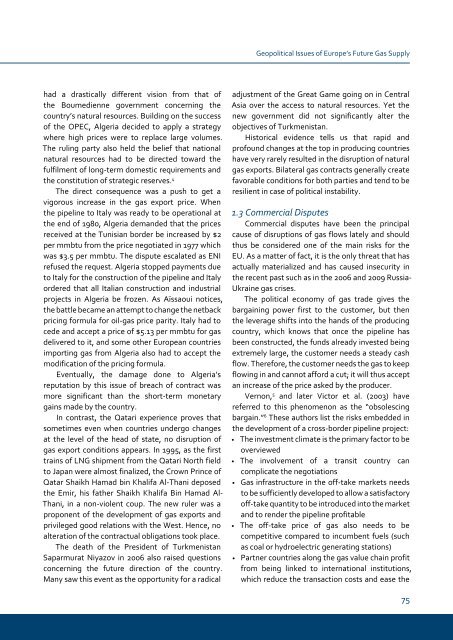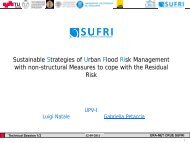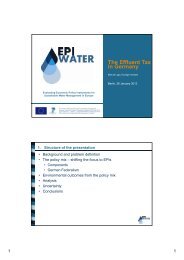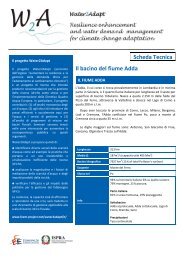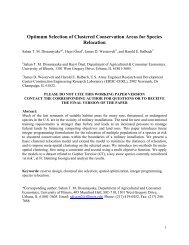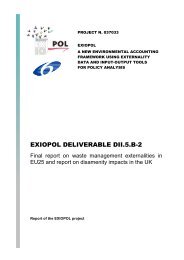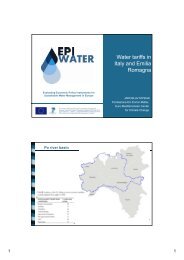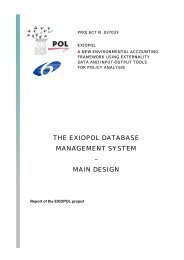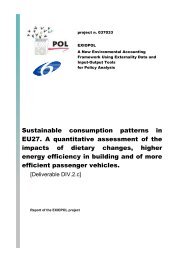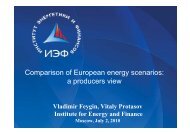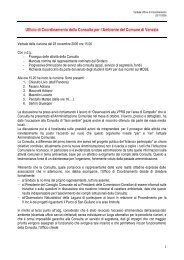Gulf and European Energy Supply Security - Feem-project.net
Gulf and European Energy Supply Security - Feem-project.net
Gulf and European Energy Supply Security - Feem-project.net
Create successful ePaper yourself
Turn your PDF publications into a flip-book with our unique Google optimized e-Paper software.
had a drastically different vision from that of<br />
the Boumedienne government concerning the<br />
country’s natural resources. Building on the success<br />
of the OPEC, Algeria decided to apply a strategy<br />
where high prices were to replace large volumes.<br />
The ruling party also held the belief that national<br />
natural resources had to be directed toward the<br />
fulfilment of long-term domestic requirements <strong>and</strong><br />
the constitution of strategic reserves. 4<br />
The direct consequence was a push to get a<br />
vigorous increase in the gas export price. When<br />
the pipeline to Italy was ready to be operational at<br />
the end of 1980, Algeria dem<strong>and</strong>ed that the prices<br />
received at the Tunisian border be increased by $2<br />
per mmbtu from the price negotiated in 1977 which<br />
was $3.5 per mmbtu. The dispute escalated as ENI<br />
refused the request. Algeria stopped payments due<br />
to Italy for the construction of the pipeline <strong>and</strong> Italy<br />
ordered that all Italian construction <strong>and</strong> industrial<br />
<strong>project</strong>s in Algeria be frozen. As Aïssaoui notices,<br />
the battle became an attempt to change the <strong>net</strong>back<br />
pricing formula for oil-gas price parity. Italy had to<br />
cede <strong>and</strong> accept a price of $5.13 per mmbtu for gas<br />
delivered to it, <strong>and</strong> some other <strong>European</strong> countries<br />
importing gas from Algeria also had to accept the<br />
modification of the pricing formula.<br />
Eventually, the damage done to Algeria’s<br />
reputation by this issue of breach of contract was<br />
more significant than the short-term mo<strong>net</strong>ary<br />
gains made by the country.<br />
In contrast, the Qatari experience proves that<br />
sometimes even when countries undergo changes<br />
at the level of the head of state, no disruption of<br />
gas export conditions appears. In 1995, as the first<br />
trains of LNG shipment from the Qatari North field<br />
to Japan were almost finalized, the Crown Prince of<br />
Qatar Shaikh Hamad bin Khalifa Al-Thani deposed<br />
the Emir, his father Shaikh Khalifa Bin Hamad Al-<br />
Thani, in a non-violent coup. The new ruler was a<br />
proponent of the development of gas exports <strong>and</strong><br />
privileged good relations with the West. Hence, no<br />
alteration of the contractual obligations took place.<br />
The death of the President of Turkmenistan<br />
Saparmurat Niyazov in 2006 also raised questions<br />
concerning the future direction of the country.<br />
Many saw this event as the opportunity for a radical<br />
Geopolitical Issues of Europe’s Future Gas <strong>Supply</strong><br />
adjustment of the Great Game going on in Central<br />
Asia over the access to natural resources. Yet the<br />
new government did not significantly alter the<br />
objectives of Turkmenistan.<br />
Historical evidence tells us that rapid <strong>and</strong><br />
profound changes at the top in producing countries<br />
have very rarely resulted in the disruption of natural<br />
gas exports. Bilateral gas contracts generally create<br />
favorable conditions for both parties <strong>and</strong> tend to be<br />
resilient in case of political instability.<br />
1.3 Commercial Disputes<br />
Commercial disputes have been the principal<br />
cause of disruptions of gas flows lately <strong>and</strong> should<br />
thus be considered one of the main risks for the<br />
EU. As a matter of fact, it is the only threat that has<br />
actually materialized <strong>and</strong> has caused insecurity in<br />
the recent past such as in the 2006 <strong>and</strong> 2009 Russia-<br />
Ukraine gas crises.<br />
The political economy of gas trade gives the<br />
bargaining power first to the customer, but then<br />
the leverage shifts into the h<strong>and</strong>s of the producing<br />
country, which knows that once the pipeline has<br />
been constructed, the funds already invested being<br />
extremely large, the customer needs a steady cash<br />
flow. Therefore, the customer needs the gas to keep<br />
flowing in <strong>and</strong> cannot afford a cut; it will thus accept<br />
an increase of the price asked by the producer.<br />
Vernon, 5 <strong>and</strong> later Victor et al. (2003) have<br />
referred to this phenomenon as the “obsolescing<br />
bargain.” 6 These authors list the risks embedded in<br />
the development of a cross-border pipeline <strong>project</strong>:<br />
• The investment climate is the primary factor to be<br />
overviewed<br />
• The involvement of a transit country can<br />
•<br />
complicate the negotiations<br />
Gas infrastructure in the off-take markets needs<br />
to be sufficiently developed to allow a satisfactory<br />
off-take quantity to be introduced into the market<br />
<strong>and</strong> to render the pipeline profitable<br />
• The off-take price of gas also needs to be<br />
competitive compared to incumbent fuels (such<br />
as coal or hydroelectric generating stations)<br />
•<br />
Partner countries along the gas value chain profit<br />
from being linked to international institutions,<br />
which reduce the transaction costs <strong>and</strong> ease the


